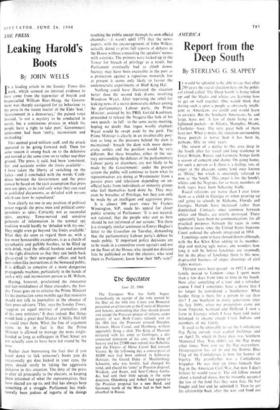Leaking Harold's Boots
By JOHN WELLS
IN a leading article in the Sunday Times this week, which seemed on internal evidence to have come from the typewriter of boyish and bespectacled William Rees-Mogg, the Govern- ment was sharply castigated for its behaviour to the press in the recent matter of the Eldo 'leak.' `Government in a democracy,' the pained voice insisted, 'is not a mystery to be conducted in secret, but a continuous process in which the people have a right to take part.' Government spokesmen had been 'shifty, inconsistent and misleading.'
This seemed good militant stuff, and the attack appeared to be going forward well. Then for some reason it swung back on to the defensive and moved at the same time on to rather marshier ground. The press, it said, had been 'consistent, fair, and accurate within the limits available'-- I have taken the liberty of switching on the italics—and it concluded with the words 'Confi- dence between the Government and the press cannot be based on the tacit assumption that press men are spies, to be told only what they can read in published documents. or deluded with Iry-ons which can later be repudiated.'
Now clearly no one in any position of political power regards the press men and political corre- spondents as spies. Certainly not as successful spies, anyway. Tense-nerved and sensitive gatherers of information in the normal spy tradition would hardly be 'deluded with try-ons.' They might even go beyond 'the limits available.' What they do seem to regard them as, with a few more honourable exceptions, is as a clutch of sycophantic and gullible boobies, to be filled up with drink, read the official handout and pointed in the right direction so that they can lurch back glassy-eyed to their newspaper offices and bark their robot-like instructions at the bemused public. It is difficult to conceive of a more dangerous propaganda machine, particularly in the hands of such a wily and inconsistent person as H. Wilson.
Having, however, proclaimed the innocence and fair-mindedness of these crusaders, the Sun- day Times goes on to criticise the Prime Minister for his instruction some months ago that ministers should not talk to journalists in the absence of their press advisers. 'This,' says the Sunday Times, 'suggests an equal mistrust of journalists and of his own ministers.' It does indeed. But things would look a great deal blacker if Shifty Hal felt he could trust them. What the line of argument seems to be in fact is that the Prime Minister is allowed to manage the news single- handed as long as colleagues in Fleet Street are not actually seen to have been led round by the nose.
Rather than bemoaning the fact that if you kneel down to lick someone's boots you do occasionally get dust kicked in your eyes, the press should surely be taking the aggressive initiative in this situation. The duty of the press is after all principally to the electors, in keeping them informed of what the representatives they have elected are up to, and that has always been something of a struggle. Parliament has tradi- tionally been jealous of reports of its doings
reaching the public except through its own official channels : —it wasn't until 1771 that the news- papers. with the encouragement of John Wilkes, actually dared to print full reports of debates in the House without concealing the speakers' names with asterisks. The printers were locked up in the Tower for breach of privilege as a result. but Parliament eventually had to climb down. Secrecy may have been excusable in the past as a protection against a rapacious monarch, but at present it seems only likely to favour the undemocratic experiments of Bluff King Hal.
Nothing could have illustrated the situation better than the second leak drama involving Woodrow Wyatt. After reproving the rebel for leaking news of a secret democratic debate among the parliamentary Labour party, the Prime Minister, assisted by his PRO, Gerald Kaufman, proceeded to release the Niagara-like leak of his own speech—in full - to the same secret meeting, hoping no doubt that rogue woolly elephant Wyatt would be swept aside by the gush. The Prime Minister is clearly in an invulnerable posi- tion as long as the pressure behind the dam is maintained : breach the dam with more demo- cratic outlets and the position would be very different. But these breaches, either in the sec- recy surrounding the debates of the parliamentary Labour party or elsewhere, are not likely to be made by the Government: under the present system the public will continue to learn what its representatives are doing at Westminster from a passive press and television depending on un- official leaks from individuals or minority groups who feel themselves hard done by. They may even be breaches of Privilege, but they can only be made by an intelligent and aggressive press.
It is almost 300 years since Sir Francis Winnington, MP, made his appeal for closer public scrutiny of Parliament. 'It is not natural, not rational, that the people who sent us here should be not informed of our actions.' Yet there is a strangely similar sentiment in Emrys Hughes's letter to the Guardian on Tuesday, demanding that the parliamentary Labour party's debate be made public. `If important policy decisions are to be made in a committee room upstairs and not on the floor of the House, why should not division lists be published so that the electors, who send them to Parliament, know how their MPs vote?'














































 Previous page
Previous page